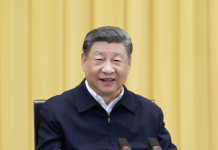
Peng Da, a 28-year-old entrepreneur, is always associated with the water caltrop because his company has created an entire industrial chain for the nut, one of the earliest domesticated crops in China.
Water caltrops are grown in East Asia for their unusual, edible seed pods. Each dark brown, hard pod contains a white, starchy nut. Rich in dietary fiber, amino acids and minerals such as iodine, the nuts not only have nutritional value but also can yield health benefits such as the prevention of thyroid problems.
Peng, then an undergraduate student at Huazhong Agricultural University, realized the business potential of growing water caltrops during a summer field trip to Tianjinghu Village of Huanggang City, Hubei Province, in 2016. That same year, he founded his company together with some schoolmates, which went on to contribute to the development of the village through innovative water caltrop cultivation.
Despite living in an area where the nut grows abundantly, farmers in Tianjinghu had long struggled to make money from this not-so-common food.
The group developed new varieties of water caltrop with higher yields and better resistance to diseases. They also adopted new technologies to process the nuts into a range of products, from water caltrop noodles to water caltrop liquor.
Over the past seven years, the company has provided more than 5,000 local farmers with employment and entrepreneurial opportunities and has created a cumulative output value of more than 100 million yuan ($13.75 million).
Inspiring stories
Peng’s story was told in a speech by Wang Yi, executive director of the secretariat of the organizing committee of the World Youth Development Forum (WYDF) and executive director of the international department of the All-China Youth Federation, at the International Forum on Sci-Tech Empowering Rural Transformation held in Beijing on November 6.
Wang said about 130,000 young Chinese choose to participate in rural development projects every year and young people play an inspiring role in China’s rural revitalization.
China’s rural revitalization strategy aims to consolidate the country’s achievements in eradicating absolute poverty (as of late 2020) through boosting rural economic development, improving rural governance and strengthening ecological protection. The main idea is to have a long-term, comprehensive framework to close the urban-rural development gap by accelerating the development of rural areas and making them more attractive to live in.
Co-hosted by the China Internet Information Center (CIIC), the Food and Agriculture Organization of the United Nations (FAO) Representation in China, the International Fund for Agricultural Development (IFAD) China Office, the World Food Programme China, and the Center for Sustainable Agricultural Mechanization of the United Nations Economic and Social Commission for Asia and the Pacific, the forum presented experiences and inspiration related to the development and transformation of rural areas to countries around the world, by sharing the innovation and entrepreneurial efforts of young people in China and other developing countries.
Around 100 representatives of social groups, research institutions, enterprises, government institutions, media organizations, UN agencies and other international institutions from China and abroad, as well as farmers who have benefited from rural development programs and undertakings, attended online and in person.
Nii Quaye-Kumah, IFAD Country Director and head of the IFAD East Asia Multi-Country Office, told the forum that he’s seen more and more young people engaging in agriculture or starting businesses in rural areas. He also noted that their use of digital technologies is enabling them to “give full play to their innovation and pioneering spirit.”
He further pointed out that China’s emphasis on nurturing and supporting young and future farmers in its rural revitalization strategy is a necessary part of the process of modernizing and urbanizing smallholder agriculture. “This is a very wise and forward-looking strategic consideration,” he added.
“Across the globe, young people are increasingly connected, informed, technologically adept and better educated than any prior generation,” Tomomi Ishida, Social Protection Officer (Rural Development) of the FAO Regional Office for Asia and the Pacific, said at the forum.
She also noted that young people tend to face unique challenges, which are often more profound than those faced by their adult counterparts, in their efforts to participate productively and effectively.
Wang said the WYDF has established a special fund and scholarship program to facilitate the provision of small grants and promote capacity building, international communication, advocacy and publicity related to youth leaders around the world. This in turn helps to involve more young people in rural transformation efforts and to promote sustainable development through scientific and technological innovation.
Sharing experiences
Peng’s case has also been included in the 100 Excellence Actions for Global Youth Development, released by the WYDF on November 1. The 100 cases were selected from 43 countries across six continents, and the average age of the youths involved is 29. It is the first in a series of annual lists compiled by an initiative known as the Action Plan for Global Youth Development.
Also included among the 100 cases is the story of Shi Minghui, a 24-year-old recent master’s degree graduate from Northwestern Polytechnic University, who founded a company in Chongqing Municipality together with 12 other young entrepreneurs.
They have developed an intelligent system that applies digital technology to agricultural irrigation, solving the problem of inaccurate and unstable irrigation in traditional agriculture. This system has now helped several farms, covering more than 8,000 hectares of land, to reduce operating costs and improve efficiency.
The forum also released the Sci-Tech Empowering Rural Transformation: 2023 Youth Innovation and Entrepreneurship report, featuring 15 inspiring stories and case studies related to young innovators and entrepreneurs from China and abroad in areas such as digital agricultural machinery, precision agriculture, the connection of smallholder farmers to markets, financial empowerment and South-South cooperation.
Wang Xiaohui, Editor in Chief of the CIIC, said in his opening address at the forum that institutional mechanisms should “effectively engage knowledgeable, passionate and energetic young people” to stimulate innovation, help them develop their abilities and allow them to become pillars of rural development.
He also stressed that more global platforms that facilitate exchanges and the sharing of experiences related to rural development among young people should be created and that new ideas, approaches, and development areas should be pursued.
Siddharth Chatterjee, the UN Resident Coordinator in China, stated in a pre-recorded video message for the forum that China’s people-centered development has led to several accomplishments, including the country’s eradication of absolute poverty in late 2020. “The experiences of China offer many potential lessons that can be shared with other developing countries on their paths toward sustainable development,” he said. –The Daily Mail-Beijing Review news exchange item





